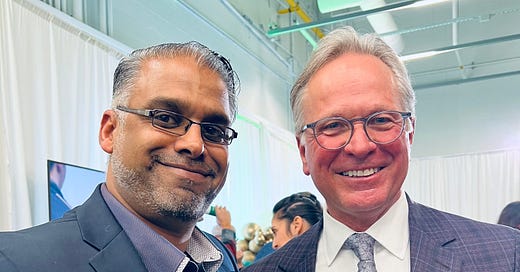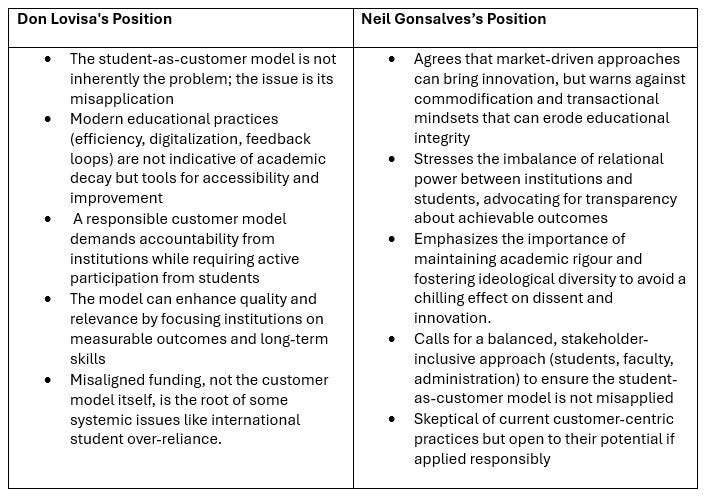The Debate
Brian Sankarsingh gives his thoughts on a recent debate between Neil Gonsalves and Don Lovisa on the subject of treating students as customers
TO OUR LOYAL READERS: Hi everyone, it’s Brian here. Before we dive into today’s article, I’d like to ask for a small favour. This year, we're aiming to grow our community of readers. We're proud to be in the top 1% of Substack publishers for consistent content — which means you can count on us for a steady stream of engaging, thought-provoking articles, all completely free.
We don’t charge for subscriptions, but if you enjoy what you read here, please consider sharing our Substack with a friend or colleague. It’s a simple way to support our work and help us reach more curious minds.
Thanks so much! Now, here’s today’s article
This debate - Be it resolved; Treating students like customers improves educational quality - between
and is a thoughtful, balanced, and respectful exploration of the student-as-customer model in higher education, with both parties offering nuanced arguments that highlight the complexity of the issue. Here are the links to the articles:Debate Part 1 - Opening Statements
Debate Part 3 - Closing Statements
Here is my personal analysis of the key points, strengths, and broader implications from each speaker:
Core Positions
Key Tensions:
1. Definition of the Student as Customer Model: Don redefines the model as one of co-creation, not consumer entitlement while Neil fears the current interpretation trends toward entitlement, grade bargaining, and a market mindset that risks eroding academic standards.
2. Impact on Quality: Don argues that the model forces institutions to clearly define and deliver quality and maintains that it has improved quality in practice but concedes it could improve further if its worst tendencies are addressed.
3. Power Dynamics: Neil is deeply concerned about the relational power imbalance, particularly when education is marketed as a product. Don counters that the model can empower students but still places responsibility on them to actively participate.
4. Systemic Challenges: Both Don and Neil acknowledge that many of higher education’s structural problems stem from chronic underfunding and flawed policy, not necessarily from the student as customer model.
Points of Convergence:
Both Neil and Don agree that:
Students should not dictate academic standards or “buy” credentials
Institutions must balance responsiveness with academic integrity
Students have responsibilities in their own learning journeys
The solution is not binary; a hybrid, balanced approach is ideal
Respectful, ideologically diverse discourse is critical to institutional growth
Strengths of the Debate:
Thoughts about Broader Implications:
This debate reveals a critical tension in contemporary education: how do we remain student-centered without becoming market-driven to the point of sacrificing educational depth? It illustrates that nuance, not extremism, is required to navigate the evolving landscape of higher education. In fact, this approach would be of great benefit to much of the current “public discourse” where we see people digging their heels in on either side of a proverbial line and arguing in black and white when they should be exploring the gray areas in between. Nevertheless, this debate suggests that collaboration between administrators, faculty, and students is essential to find sustainable solutions, and it models civic discourse even when the stakes and viewpoints are high, respectful engagement is possible and productive.
My Personal Thoughts:
I am not an educator and had no previous bias before reading this series of articles. Both debaters make strong cases. Don Lovisa’s optimism about the potential of the customer model is compelling, but Neil Gonsalves’ warnings about the risks of misapplication and commodification are well-founded and necessary. The most powerful takeaway is the idea that answers are rarely either/or instead they are found in the space where divergent ideas respectfully meet and evolve together.
Bio: Brian Sankarsingh is a poetic firebrand, a sharp, thoughtful storyteller who walks the crossroads where Caribbean folklore, social justice, and the human condition collide. He is a truth-seeker who questions political tribes, challenges lazy platitudes, and writes with a deep pulse of empathy, always pushing for nuance whether you're exploring grief, cultural identity, or the monsters that haunt cane fields and hearts alike. He blends advocacy and art seamlessly. He is part historian, part philosopher, part bard, driven by a hunger to illuminate overlooked stories and empower marginalized voices.
Thanks for reading Seeking Veritas Blank Pages to Bold Voices. Subscribe for free to receive new posts and support my work.







